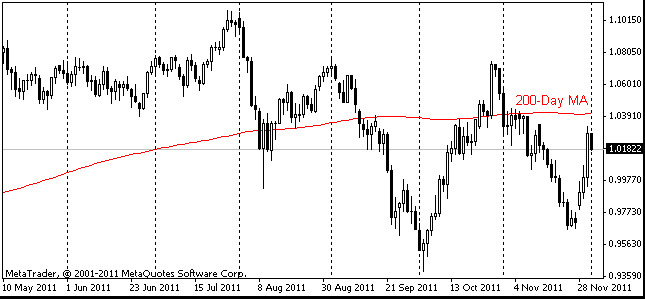EUR/usd
Last week the demand for three-year loans issued by the ECB at a fixed rate was twice as high as expected and amounted to 489 billion euros. And here is another piece of news: banks' deposits to the ECB set a record making 412 billion euros. Banks behave like bargain hunters in a sale. They‘re grabbing everything that is cheap without thinking whether they really need all this stuff. In addition, the increase in the ECB deposit facility reflects the deplorable state of affairs in the sphere of interbank lending. It is not very good. Banks are waiting to see what will happen with the troubled states' bonds on their balance sheets and are also building up their reserves to meet more rigid standards of Tier I capital. The lending of households, companies and other banks can be forgotten for a while. Perhaps it is right as far as every singular link in a chain is concerned, but on the whole it may have unfavourable consequences like deterioration of the economic situation, higher uncertainty and greater demand for safe assets. To counterbalance this there will be only a soft monetary policy of major central banks and their monetary incentives like another QE, purchases of banks' troubled assets or long-term loans. It won't be surprising that already in the first weeks of the new year, when volumes will again return to the markets, banks' reluctance to lend combined with deteriorating prospects of the euro-Zone economy will force the ECB to further temper their policy, which will weaken the euro against most of its competitors.

GBP/USD
The market has gone on Christmas holidays, and it seems that nothing can shake it up. The purchases of the British pound were carried out with some caution yesterday. The currency once again went to 1.57, but then no one ventured to continue buying. Even positive reports on the American consumers' sentiment didn't manage to help the situation. CB Consumer Confidence Index was, perhaps, the only important statistical release on Tuesday. Its rate exceeded economists' expectations, going up to 64.5 in December against 55.2 a month earlier. There wasn't any other significant news from UK as Christmas celebrations were still at full tilt there. Despite the fact that today is formally a working day, no important statistics have been scheduled for the European and American session. Only data from Japan have evoked some interest, but see more on that below.

USD/JPY
In the absence of news from Europe and America, only Japan has more or less interesting statistics. Despite the fact that its impact on markets is low, it is still worth mentioning. Inflation on the whole has turned out to be worse than expected, i.e. deflation has increased. This slowdown in price growth, characteristic of the whole world now, in Japan leads to a strong decrease in prices and, consequently, to the decline of consumer activity. The November CPI has showed a 0.5% decrease y / y, while the preliminary data from Tokyo have reflected a 0.4% price reduction in this year's December against the previous year's December. The data on consumer spending have marked a 3.2% decline in November as compared with the previous year. The unemployment rate has remained unchanged at 4.5% in comparison with the previous month and has become lower as against the 5.1% level of the previous year. But these data hide unfortunate changes. Over this year the work-force size has decreased by 300,000, while the number of the employed has gone up by 80,000. These data have put pressure on the Asian stock markets, as well as on the USD/JPY, which dropped from 77.90 on opening to 77.75 on the news.

AUD/USD
Australia like the upper part of the world remains caught up in Christmas holidays, so the pair is still driven by the markets. More specifically, a certain correction in the gold market and the rise of the yen in the morning caused the sale of the Australian currency, bringing the AUD/USD below 1.0150. Though the pair was at this very level a day ago. There is a chance that the stock markets and demand for risky assets will continue to grow for some time at the beginning of the next year as investors will be rebalancing their portfolios. The move to liquidity has already occurred at the end of the year, 2011 was also the year of safe assets with a fixed income, so the beginning of the next year may become the period of the high beta aussie and Kiwi, of course if there is no sharp deterioration of the situation in Europe and elsewhere in the financial markets.
